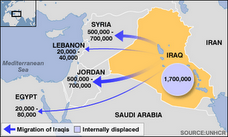VICTORY IS NOT AN OPTION, William Odem, Washington Post For the moment, the collision of the public's clarity of mind, the president's relentless pursuit of defeat and Congress's anxiety has paralyzed us. We may be doomed to two more years of chasing the mirage of democracy in Iraq and possibly widening the war to Iran. But this is not inevitable. A Congress, or a president, prepared to quit the game of "who gets the blame" could begin to alter American strategy in ways that will vastly improve the prospects of a more stable Middle East. No task is more important to the well-being of the United States. We face great peril in that troubled region, and improving our prospects will be difficult. First of all, it will require, from Congress at least, public acknowledgment that the president's policy is based on illusions, not realities. There never has been any right way to invade and transform Iraq. Most Americans need no further convincing, but two truths ought to put the matter beyond question:
First, the assumption that the United States could create a liberal, constitutional democracy in Iraq defies just about everything known by professional students of the topic. Of the more than 40 democracies created since World War II, fewer than 10 can be considered truly "constitutional" -- meaning that their domestic order is protected by a broadly accepted rule of law, and has survived for at least a generation. None is a country with Arabic and Muslim political cultures. None has deep sectarian and ethnic fissures like those in Iraq.
Strangely, American political scientists whose business it is to know these things have been irresponsibly quiet. In the lead-up to the March 2003 invasion, neoconservative agitators shouted insults at anyone who dared to mention the many findings of academic research on how democracies evolve. They also ignored our own struggles over two centuries to create the democracy Americans enjoy today. Somehow Iraqis are now expected to create a constitutional order in a country with no conditions favoring it.
This is not to say that Arabs cannot become liberal democrats. When they immigrate to the United States, many do so quickly. But it is to say that Arab countries, as well as a large majority of all countries, find creating a stable constitutional democracy beyond their capacities. Second, to expect any Iraqi leader who can hold his country together to be pro-American, or to share American goals, is to abandon common sense. It took the United States more than a century to get over its hostility toward British occupation. (In 1914, a majority of the public favored supporting Germany against Britain.) Every month of the U.S. occupation, polls have recorded Iraqis' rising animosity toward the United States. Even supporters of an American military presence say that it is acceptable temporarily and only to prevent either of the warring sides in Iraq from winning. Today the Iraqi government survives only because its senior members and their families live within the heavily guarded Green Zone, which houses the U.S. Embassy and military command. ...The first and most critical step is to recognize that fighting on now simply prolongs our losses and blocks the way to a new strategy. Getting out of Iraq is the pre-condition for creating new strategic options. Withdrawal will take away the conditions that allow our enemies in the region to enjoy our pain. It will awaken those European states reluctant to collaborate with us in Iraq and the region. read more by clicking headline William E. Odom, a retired Army lieutenant general, was head of Army intelligence and director of the National Security Agency under Ronald Reagan. He served on the National Security Council staff under Jimmy Carter. A West Point graduate with a PhD from Columbia, Odom teaches at Yale and is a fellow of the Hudson Institute.
Sunday, February 11, 2007
Subscribe to:
Post Comments (Atom)





No comments:
Post a Comment